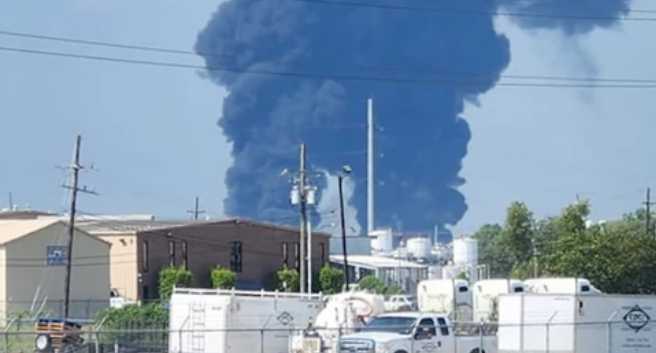In an unexpected news release, the Flint Hills Refinery announced the closure of its operations in North Pole in a striking blow to the small community there.
Flint Hills Resources announced that they will be closing their refinery facility and laying off 80 of the employees working there. 45 of the Flint Hills employees will retain their jobs. 35 of those will remain to run the storage and shipping terminal in North Pole and another ten will continue working at the terminal in Anchorage.
Flint Hills stated that they will be processing gasoline until May 1 and continue jet fuel and heating oil production for another month beyond that.
The North Pole refinery has been operating in North Pole since 1977 and has been producing gasoline, jet fuel, asphalt and other specialty fuels. Currently, it produces about 51,000 barrels of jet fuel a day and approximately 34,000 barrels of gas and other fuels. Koch Industries purchased the refinery from WIlliams Alaska Petroleum in 2004.
While in the past the refinery has blamed various conditions such as rising costs of North Slope crude and operating costs, this time Flint Hills Vice President Mike Brose said in a statement, “With the already extremely difficult refining market conditions, the added burden of excessive costs and uncertainties over future cleanup responsibilities make continued refining operations impossible.” Brose said the company would continue to remove sulfolane from the site as per their obligations.
The announcement comes five days before the end of the public comment period on the Notice of Request for Adjudicatory Hearing on DEC’s Conditional Approval of the Revised Human Health Risk Assessment for Flint Hills North Pole Refinery. The request challenges the establishment of a site-specific alternative cleanup level (ACL) for sulfolane in groundwater of 14 parts per billion (ppb). DEC decided on that cleanup level using new toxicity data and on the advise of state and federal agencies.
Flint Hills requested the Alaska Department of Environmental Conservation to allow a concentration of 362 parts per billion before cleanup would be nesessary. The allowable limit was at about that level when the plant was purchased from Williams. But, currently sulfolene has been detected beyond the boundries of the facility and in the municipal water supply and approximately 300 water wells in the North Pole area. The level of sulfolane in the wells tested ranged from 10 ppb to 443 ppb. Flint Hills has been supplying many of those with an alternate water supply such as bottled water.
Sulfolane was developed by Shell Oil Company in the 1960s and is commonly used in the refinment process to make gasoline. Sulfolane is readily dissolved into the water supply rather than sticking to the soil or evaporating.
There have been limited studies of the effects of sulfolane on animal subjects, where animals have been administered a single high dose of sulfolane resulting in acute short term effects to their central nervous system, where some mortality occured. In longer term(six months)-lower dosage studies with animals, reduced white blood cell counts in females, fatty liver and splenic white pulp shrinkage, as well as hyaline droplets in male kidneys was observed. No studies have been done on human subjects and the long-term effects of the man-made chemical is unknown.
Upon hearing the announcement by Flint Hills, Alaska’s governor, Sean Parnell released a statement saying, “The negative impacts of this closure will be felt across our state, particularly by those in North Pole,” Governor Parnell said. “I am extremely concerned for those who will lose their jobs and the families that will be impacted. I have directed the Department of Labor and Workforce Development to be a resource for these Alaskans, helping them to find new opportunities in Alaska’s strong economy.”
Representative Don Young responded via press release as well. “Today’s announcement by Flint Hills is disappointing,” said Congressman Don Young. “At a time when we should be encouraging expanded production and value added manufacturing of the abundant energy resources our state and nation have been blessed with, we see companies like Flint Hills shuttering their operations due to deteriorating conditions caused by diminished supplies and onerous regulation. If this doesn’t open our eyes to the current environment in the energy sector, I don’t know what will.”
The Interior Delegation to the Alaska Legislature had responses to the announcement of the shutdown as well.
“This is a sad day for the entire Interior region and Alaska as a whole,” Delegation Chair Rep. Pete Higgins, R-Fairbanks, said. “We will be looking to the governor for his leadership in the coming days, which will hopefully address the Dept. of Environmental Conservation decisions that forced Flint Hills into making this announcement. This will have far-reaching impacts economically to the Interior. The news hit us hard and fast today, and we will be working with the governor and the DEC to alleviate the impact to the families and businesses affected by the shutdown.”
“I am very disappointed,” Senate Majority Leader John Coghill, R-North Pole, said. “It will have a huge negative impact on workers and our community and our state.”
“I am LIVID! This is terrible news for North Pole and for all of Alaska,” Rep. Doug Isaacson, R-North Pole, said. “In my opinion this was foreseeable and preventable. The domino effect of losing 81 refinery jobs means 800 jobs are affected. The railroad that will lose substantial revenue and the communities that will hurt significantly.”
“More stringent regulations hit close to home,” Rep. Tammie Wilson, R-Fairbanks/North Pole, said. “Unrealistic expectations by the DEC played a major role in the closing. The ripple effect of this tragedy will be felt by the entire community. We must make sure we take care of all those effected.”
“This is very bad news for Fairbanks and North Pole, and Alaska, and for all of Flint Hills’ employees and customers, including our military bases,” Sen. Click Bishop, R-Fairbanks, said. “How difficult will it now be for us to sell the Air Force on the idea of locating their new F-35s at Eielson Air Force Base, when our source of jet fuel is shutting down?”
“I don’t know how, but we need to fix this,” Senate Finance Co-Chair Pete Kelly, R-Fairbanks, said. “Fairbanks didn’t accept high heating bills and we’ve got a trucking project on the way. We didn’t accept what was happening with the military and we fixed that. Healy Clean Coal. A gas line project. If we can turn those things around we can turn this around too.”
“The announcement today regarding Flint Hills shutting its doors came as a shock,” Rep. Steve Thompson, R-Fairbanks, said. “We will continue to monitor the situation as to loss of jobs, groundwater contamination, and the economic impact this will have on our community.”
“Fairbanksans and Interior Alaska know actions speak louder than words: The Koch Brothers are closing the refinery and tossing Alaska aside while choosing to invest hundreds of millions in political attacks. It shows how little they care about Alaska and Alaskans,” said Mike Wenstrup, Fairbanks resident and Chair of the Alaska Democratic Party.
None of the responses by our state leaders addressed the issue of sulfolane and its possible medical ramifications on the residents of the community of North Pole.






